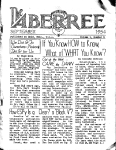What of 'WHAT You Know?" | New Definition Proposed
What of 'WHAT You Know?
(Off Page 1. You still with us?)
of things he cannot see or control. Scientology offers methods for altering that condition. It offers theory, procedure and drills for the application of attention to one's universe, in order to change it to something more acceptable.
If this were carried to the ultimate point, the individual would be absolutely clear, needing no universe at all, and particularly no real universe. Knowing would be with a capital K, and there would be nothing to know. Such a being would have no more use for a science of knowing than a ghost would have for a medical doctor. We are reasonably sure that none of the Scientology community has reached this pinnacle. Some, however, have unoccluded and taken responsibility for their universes to a degree which permits considerable rearrangement of the content and, through this, of the real world around them. This is an admirable effect: all by itself, it makes Scientology worth while for these people.
Others, instead of applying the methods of Scientology to their own universes, to improve them, have forsaken their own universes and have moved into a special universe created by L. Ron Hubbard as an experimental laboratory for the development of Scientology. Here, they worship the god 0. T., play ceremonial tapes, and set out to conquer a "real" universe which is real only in their special laboratory universe.
Scientology contains methods for solving problems, but it will not solve these problems unless it is applied to them. It cannot be applied in a vacuum. It cannot be applied with any result in a false-front universe. Rote exercises, for example, are good, as rifle practice is good: they teach one to load, aim, and fire. But there will be nothing in the pot unless we bring the rifle to bear upon an edible target. "Knowing how to know -- what?" is another way of saying, "Shooting at what?"
Mock-up and no-mock-up drills, by sheer volume and variety, bring the rifle to bear upon many targets, but the confirmed neurotic can always keep the prime target, his main activated delusion, out of range. Only when his goal to have that delusion changes will he allow the sights to swing over. Many of those who attend session after session of group processing are working on their courage to let the sights swing over. Eventually, some of them may make it. The drills help in this by cutting away minor problems and by educating the individual into a more
New Definition Proposed
Some people ask too many questions. For example, when we told a questioner that Scientology was "the science of knowing how to know", he, only 13, asked "Knowing how to know what?"
We pondered that a bit, wrote an Auditorial (see Page 2), and when that failed to satisfy us, we wrote Richard deMille, asking him the same question. Dick, wh wrote the 50 Professional Course Booklets under the name of D. Folgere, the popular "Introduction to Scientology", and has been publicly rated by L. Ron Hubbard as one of the top auditors, proposed a new definition:
"SCIENTOLOGY: A study and theory of being which provides methods for the application of attention to one's own universe (one's mind) for the purpose of re-ordering and impoving that universe."
Dick added that he wasn't too pleased with the new definition, but thought it better than the old.
Also, he wrote the accompanying article for The ABERREE. You might as well read it; it costs nothing extra, and you might get a good idea or two from it.


